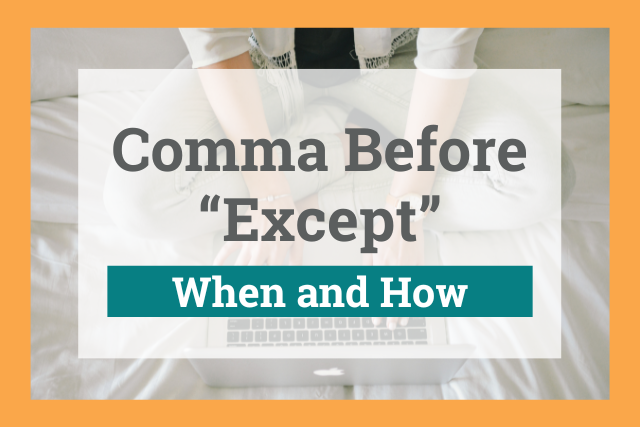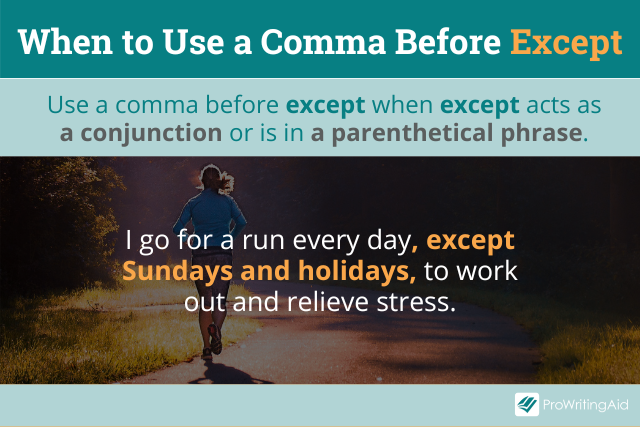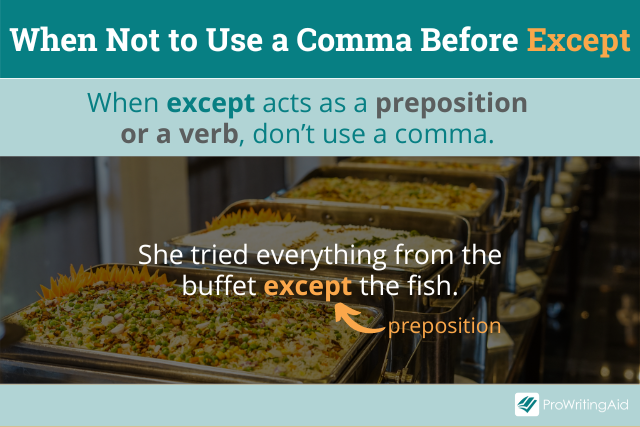
When deciding whether to use a comma before except, you must know which part of speech except is functioning as.
When except functions as a conjunction or a parenthetical element, use a comma. But when it functions as a preposition, you do not need a comma before the word except.
Today, we’re explaining how to determine the function of except in a sentence so you know how to use except comma rules correctly.
Even grammar experts make comma mistakes! You can always use a grammar checker to ensure you don’t use any unnecessary commas.
When Do You Need a Comma Before Except?
Except is an interesting word because it can be several parts of speech.
Sometimes, except acts as a conjunction in a sentence. When this is the case, you should use a comma before the word except.
Except can be a coordinating conjunction that is synonymous with “but.” Because the word except essentially replaces but, you should follow the comma rule about coordinating conjunctions.

When a conjunction connects two independent clauses, place a comma before the conjunction.
- I wanted to go shopping, except I was broke until payday.
In the example above, we could easily replace except with but.
- I wanted to go shopping, but I was broke until payday.
Except doesn’t always separate independent clauses. Sometimes it acts as a subordinating conjunction or starts an adverbial phrase.
A subordinating conjunction connects an independent clause to a dependent clause.
An adverbial phrase is a dependent clause that functions like an adverb: it modifies another part of the sentence such as a verb, adjective, or adverb.
When except is part of an adverbial clause, the words “when” or “that” often follow it. You should use a comma before except in these cases.
- The teacher always lets students have their phones out, except when the principal is in the room.
Sometimes, except sets information apart from the rest of the sentence. These parenthetical phrases are clauses inserted into a sentence.
When it comes to comma rules, we treat these phrases like non-restrictive phrases, or non-essential entities to the sentence. Non-restrictive phrases require commas before and after them.
However, even though we treat them as non-essential with relation to the comma rules used, removing parenthetical phrases including except will usually change the implicit meaning of a sentence.
Let’s look at an example:
- I go for a run every day, except Sundays and holidays, to work out and relieve stress.
You can see that we placed the commas on either side of the parenthetical phrase, “except Sundays and holidays.” This is the rule we mentioned above about non-essential entities in sentences.
But if we removed the parenthetical phrase, the implicit meaning of the sentence changes.
It suggests that the speaker goes for a run every day without exception. This makes it essential to the sentence, but we still place commas around the phrase as if it were a non-restrictive clause.
Remember: except is the exception to the restrictive and non-restrictive phrase rules.
Examples of Except Comma Rules
Let’s check out a few examples of when to use a comma with except. The first set are examples of except as a coordinating conjunction.
- She tried to get tickets for the play, except they sold out early.
- We wanted to buy a house this year, except the interest rates are outrageous.
- He would make a perfect husband, except he doesn’t know how to cook.
Here are some examples of except as a subordinating conjunction before adverbial phrases:
- I love going camping, except when it’s over 100 degrees outside.
- We wanted to buy a king-sized bed, except that our bedroom isn’t big enough for it.
- A road trip sounds like fun, except that the cost of fuel is so high right now.
Finally, here are a few examples of parenthetical clauses inserted into sentences with except:
- Every morning, except on Mondays, she goes for a swim.
- We visit our grandparents every holiday, except Memorial Day, because they have a big house and a pool.
- She invited everyone in the class, except Joan and me, to her birthday party.
When Shouldn’t You Use a Comma Before Except?

We’ve looked at ways that except can act as a conjunction and a parenthetical element. But, except can also act as a preposition. If except is functioning as a preposition, you should not use a comma before it.
A preposition is a word that shows a relationship between nouns or pronouns and another element in a sentence. Prepositions usually precede a noun or pronoun.
To determine if except is acting as a preposition, you can look at the word directly after it.
If the word after except is a noun or pronoun or if it’s another preposition, particularly for, then except is a preposition. When this is the case, leave off the comma.
- She tried everything from the buffet except the fish.
You might notice that the parenthetical elements in the previous section didn’t follow this rule. If except is acting as a preposition in a parenthetical phrase in the middle of a sentence, you should use commas.
But if it’s a prepositional phrase at the end of a sentence like the example above, no comma is necessary.
Finally, except is sometimes a verb that means to exclude or omit. Do not use a comma before except when it’s a verb.
- They excepted new hires from the annual bonus.
Examples of Except and No Comma
Here are some examples of when you don’t need a comma because except is acting as a preposition:
- I recognized all the actors in the movie except the sidekick.
- She had fond memories of all her visits to the lake except for the time she was bitten by leeches.
- The library opens at 10 a.m. every day except Thursdays.
And here are some examples of except used as a verb, which also does not require a comma:
- My boss is great because she always excepts tardies from our annual evaluation.
- Mexico excepts U.S. children under 18 from passport requirements.
- The dental policy excepted cosmetic procedures from coverage.
To determine whether or not you need a comma before except, you just need to pay attention to the part of speech.
Remember, whenever except is a conjunction or in a parenthetical phrase, you need a comma. If except is a preposition or a verb, leave off the comma.


